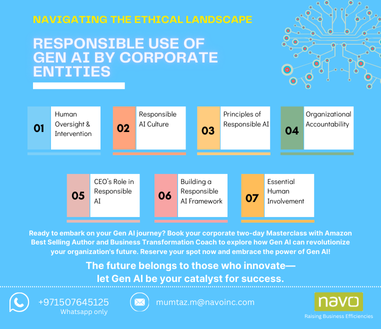In recent years, the rise of Generative Artificial Intelligence (AI) has reshaped industries, offering unparalleled capabilities in content creation, design, and decision-making. However, as corporations harness this power, ensuring responsible use becomes paramount to maintain trust and uphold ethical standards. Here’s a comprehensive guide for corporate entities to navigate the ethical landscape of Generative AI.
Human Oversight and Intervention
Corporate entities must prioritize human oversight and intervention during AI deployment to establish clear boundaries, uphold ethical standards, and align AI systems with corporate and societal values.
Responsible AI Culture
Successful AI implementation necessitates embedding responsible AI principles within the organizational culture. This involves leaders understanding AI capabilities, holding managers accountable for collaboration, and providing resources for responsible AI use.
Principles of Responsible AI
Ethical AI practices revolve around principles such as equity, reliability, security, and auditing data to mitigate bias and discrimination.
Organizational Accountability
Companies need to introduce accountability through a defined organizational structure, assigning roles for responsible AI governance, mitigating risks, and ensuring the robustness of AI systems.
CEO’s Role in Responsible AI
CEOs play a pivotal role in ensuring responsible AI use within their organizations. Their understanding of AI development prevents potential ethical issues and ensures AI systems are built responsibly.
Building a Responsible AI Framework
Responsible AI frameworks should ensure lawful AI use, respect data privacy, mitigate risks, understand social impact, and clearly distinguish AI from human input.
Essential Human Involvement
Lastly, it’s crucial to emphasize that there must always be a human overseeing any auto-generated system. Humans provide critical judgment, context, and ethical decision-making that AI systems alone cannot replicate.
In summary, responsible AI practices, transparency, accountability, and ethical considerations are essential in the deployment of AI technologies within corporate entities. By prioritizing human oversight, fostering a responsible AI culture, and implementing robust frameworks, organizations can navigate the ethical landscape of Generative AI with integrity and trustworthiness.
About the Author
Vasudevan Kidambi, known as the “LAST-MILE MAN,” is a distinguished corporate expert with over 30 years of experience in operations and consultancy. As Managing Director of Navo Informatica Pvt. Ltd and Navo Management Consultants, he’s a pioneer in integrating Generative AI into business strategies, enhancing efficiency and innovation. Vasudevan’s unique approach includes his advocacy for One-Page Communication and extensive use of AI in content development and business applications.
His debut book, “One Page Communicator,” swiftly ascended to Amazon’s #1 bestseller spot within days of its launch and subsequently clinched the Golden Book of the Year Award for 2024.
Additionally, as Director of Business Transformation at Zenesis Corporation, Dubai, he continues to drive change. He’s also an educator and thought leader in AI, conducting boot camps and webinars to simplify AI tool usage for professionals.
His expertise in design thinking, data storytelling, digital workflow automation, and cognitive bots is transforming businesses globally, cementing his status as a holistic consultant in the digital era.


